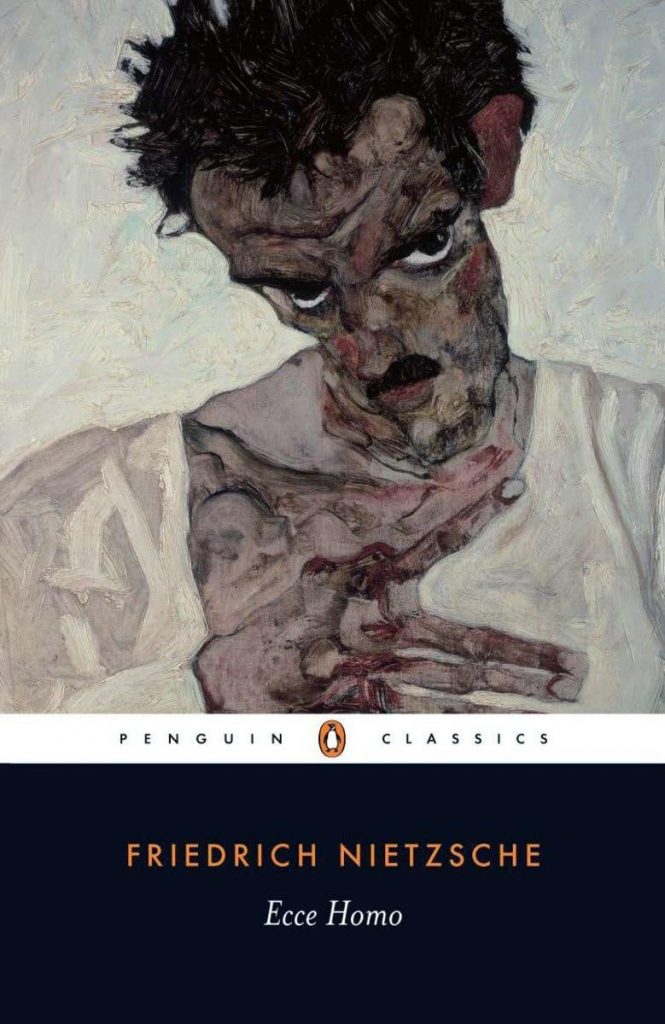Searching for a profound reading experience, we recently turned the pages of Friedrich Nietzsche’s “Ecce Homo,” a captivating autobiography that serves as a window into the philosopher’s audacious spirit. Grabbing our attention not just by its content but by its quality as well, this Penguin Classics Revised Edition stands as an engaging exploration of Nietzsche’s personal insights.
The book’s presentation invites reflection, with a crisp, clear font and a binding that feels durable in-hand. Its brevity is no handicap; instead, it packs a potent philosophical punch in its 144 pages. Nietzsche’s writing teeters on the brink of bravado and brilliance, sparking laughter with his confidence yet offering profound takeaways that linger long after the final sentence.
Without diving into exhaustive detail, we noticed how the translation and formatting respect the original work’s integrity, facilitating a seamless reading experience. Despite Nietzsche’s complex thoughts, the edition makes a compelling case for its accessibility, catering to both seasoned readers and newcomers to Nietzschean philosophy.
Bottom Line
For those yearning to delve into the mind of Nietzsche, “Ecce Homo” offers an undeniably magnetic literary journey.
Its conciseness, coupled with a robust translation, renders it a must-read for those intrigued by one of philosophy’s most influential figures.
Curious about this thought-provoking dive into self-reflection and intellectual exuberance? Dive into “Ecce Homo” now.
Overview of Ecce Homo: How One Becomes What One Is–Revised Edition (Penguin Classics)
In our experience with the revised edition of Friedrich Nietzsche’s “Ecce Homo,” we found it to be a thought-provoking autobiographical work where Nietzsche introspects and scrutinizes his life and works. This edition, with its 4.4-star rating, seems to resonate well with a good number of readers, judging by the 258 ratings it has garnered.
As a classic in philosophical literature, this book challenges the reader with Nietzsche’s unconventional views on morality and self-actualization. This edition particularly stands out with its quality Penguin Classics translation that makes Nietzsche’s complex ideas more accessible without losing their original power. However, it’s worth noting that the fluidity of such challenging philosophical text may still require a patient and reflective reader to truly grasp the nuances present in Nietzsche’s narrative.
The book’s physical quality is in line with what we’ve come to expect from Penguin Classics, offering both durability and a pleasing aesthetic for a paperback. The cover design evokes a timeless feel apt for a classic, making it a welcome addition to our shelves. Overall, while this may not be an easy read for everyone, those who invest the time are often rewarded with rich insights into one of the most influential philosophers of modern times.
Unique Philosophical Insights
When pondering over the ideas presented in “Ecce Homo” by Friedrich Nietzsche, one is struck by the depth and originality of his self-examination. This revised edition encapsulates Nietzsche’s profound and often controversital ruminations on his own life, his successes, and his philosophies.
Our reading of this text was transformative; Nietzsche challenges us to confront our own beliefs and the essence of what makes us who we are. His bracing honesty and the way he dissects his life and work compel us to reflect on our own paths and the principles that guide us.
On the flip side, for those seeking a more structured philosophical argument or systematic exposition of Nietzsche’s thought, “Ecce Homo” may disappoint. Nietzsche’s narrative can be seen as somewhat disjointed, teetering between genius and rambling.
All in all, our engagement with the book left us debating and discussing long after the last page was turned. It’s a testament to Nietzsche’s enduring relevance and his ability to provoke thought in even the most modern of readers.
Compact and Portable Design
Our hands-on experience with this Penguin Classics edition reveals the true convenience of its design – it’s notably lightweight and certainly easy to carry around. With dimensions that fit comfortably into any day bag, we found ourselves reaching for it during commutes and between tasks. At just under four ounces, it’s almost as if you’re carrying nothing at all. The slim profile is a significant plus, making it unobtrusive when packed into a tightly stuffed suitcase, ideal for those of us who like to travel with a good read.
There’s a pleasure in holding a book that doesn’t strain your wrists, and this edition fits the bill. It’s perfect for reading in various settings, whether lounging at the park or during a quick coffee break. Its sturdiness matches its elegant form factor, resisting the usual wear and tear remarkably well, considering its paperback nature. However, we noted that for a voracious reader, frequently slipping it in and out of bags might wear down the cover over time. Overall, it scores high on portability without compromising on durability.
Historical Significance
In our experience with “Ecce Homo: How One Becomes What One Is,” we found it to be more than just a literary classic. Authored by Friedrich Nietzsche, a philosopher who has significantly shaped modern thought, this book offers a profound glimpse into his mind. Our reading offered us an insight into the roots of existentialism and the stirrings of nihilism, reinforcing its historic importance. We appreciated Nietzsche’s daring critique of morality and culture, though some may find these perspectives unsettling. As a revised edition, it’s meticulously edited to reflect the original writings, further cementing its place in philosophical studies. While engaging with this Penguin Classic, we felt connected to the historical discussions that have long since influenced intellectual debate. The strength of “Ecce Homo” lies in its raw, thought-provoking content rather than any embellishments, ensuring its lasting relevance.
Pros and Cons
After spending some quality time with “Ecce Homo” by Nietzsche, we’ve gathered our thoughts to share with prospective readers. This revised edition truly offers a unique perspective into Nietzsche’s mind, and as we turned the pages, we couldn’t help but be amused by the boldness in his expressions.
Pros
- Entertaining Read: The book provides an enjoyable experience, and it’s not uncommon to find oneself chuckling at Nietzsche’s unabashed confidence.
- Quality Translation: For readers who seek a good English version, this edition stands out with its clear translation, avoiding the pitfalls of some cheaper alternatives.
- Insightful: Whether you agree with him or not, Nietzsche’s musings on his own philosophies are thought-provoking and offer a relatable depth for certain readers, especially those familiar with his other works.
- Formatting: The digital version of the book impresses with its fine formatting, which isn’t always a given in eBooks.
- Physical Quality: The printed edition receives praise for its quality cover and overall presentation, deemed as good value for the price.
Cons
- Arrogance Off-Putting: Nietzsche’s self-assurance is a double-edged sword; some readers find his tone distracting and off-putting, despite the translator’s efforts in the introduction to soften this perception.
- Print Quality Inconsistency: There are comments about poor print quality in some editions, which can detract from the reading experience.
- Prerequisite Reading: To fully grasp the nuances of “Ecce Homo,” prior knowledge of Nietzsche’s bibliography is recommended, making it less accessible to newcomers.
- Language Barriers: Non-German readers have reported frustrations with finding translations that capture the original’s essence, specifically pointing out the Spanish editions.
In our view, this revised edition of “Ecce Homo” has its highs and lows, but it remains a captivating exploration of Nietzsche’s philosophies for those who appreciate literary candidness and have the background to navigate his complex thoughts.
Exploration of Nietzsche’s Style
In our hands, the revised edition of Ecce Homo by Friedrich Nietzsche offers a window into his provocative thinking. Known for his aphoristic style, Nietzsche challenges readers with complex ideas presented in a seemingly straightforward manner. Our recent reading revealed a text that’s both engaging and demanding. Nietzsche’s rhetoric is powerful; his clever use of language captivates us, while his tendency to contradict himself requires a more investigative approach to fully appreciate the nuance.
The structure of this Penguin Classics edition aids in navigating Nietzsche’s profound assertions about life and philosophy. However, some readers might find the density of Nietzsche’s prose a bit daunting. Despite this, we’re enthralled by the vigor and fearlessness with which Nietzsche dissects the constructs of society and self. While the book’s eccentricity may be off-putting to some, for those willing to embrace its intensity, it proves to be a stimulating read.
Customer Reviews
Having recently spent time with “Ecce Homo” from Penguin Classics, we can share some insights based on the collective experience reflected in customer feedback. The overall sentiment is undeniably positive, with the book boasting a respectable 4.4 out of 5 star average from over 250 ratings. Readers have expressed genuine amusement and fascination with Nietzsche’s audacious tone. Indeed, his idiosyncratic style – a blend of wit, confidence, and profound introspection – has garnered both praise and criticism.
While many have lauded the revised edition for its insight into Nietzsche’s mind, some have voiced concerns over the perceived arrogance in the text, which for a few detracted from the philosophical exploration. The physical quality of the print has been a point of contention as well, with variations in reader satisfaction. On the digital front, the ebook format receives nods for its clean layout and functionality, suggesting that it is a good bet for those who prioritize reading convenience.
There’s a recurring recommendation for those new to Nietzsche to familiarize themselves with his other works before diving into this autobiographical exposition. This, as voiced by some readers, may provide a fuller context and enrich the reading experience. Among multilingual readers, there have been specific praises for certain translations, advising others to choose wisely to avoid trudging through cumbersome prose.
From our time with ‘Ecce Homo,’ it’s evident that its appeal is as complex and varied as its author’s thoughts. While it has its critics, Nietzsche’s bold narrative and the edition’s fidelity to his vision secure its place as a provocative and stimulating read for those intrigued by one of philosophy’s most polarizing figures.
Conclusion
Wrapping up our experience with “Ecce Homo,” it’s clear why Nietzsche’s work has sparked widespread discussion. The book’s autobiographical style provides intimate insights into his philosophies, though his confident tone can come across as arrogance to some. We chuckled at the brazenness of his self-assuredness, and while this may be off-putting for certain readers, it serves as a candid peek into Nietzsche’s mind.
For those new to Nietzsche, the text can be a peculiar mix of personal revelation and philosophical exposition. The revised Penguin Classics edition offers a reliable translation, with attention to preserving Nietzsche’s provocative style. However, it’s worth noting that some readers have mentioned quality issues with the print version.
The electronic formatting is generally well-done, avoiding the common pitfalls of many ebooks. Our enjoyment of Nietzsche’s insights was enhanced by the smooth reading experience, and this plays a role in our overall positive impression. Our journey through “Ecce Homo” felt like an intimate conversation with the philosopher himself—though one might occasionally wish to interject or disagree. Nevertheless, for admirers of Nietzsche’s work or those diving into his world, this edition withstands scrutiny and can be a worthwhile addition to the bookshelf.
Related books:
- Beyond Good and Evil Review: A Philosophy Staple?



